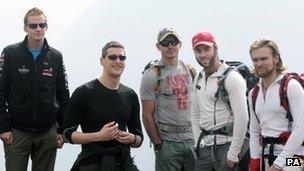Injured UK soldiers abandon Mount Everest charity climb
- Published
Prince Harry: ''These people - ours and yours - are extraordinary''
A group of injured UK soldiers has been forced to abandon an attempt to climb Mount Everest because of safety fears.
The charity Walking with the Wounded said unseasonably warm weather had increased the risk of avalanches.
Expedition manager Martin Hewitt <link> <caption>said he was "gutted",</caption> <url href="http://walkingwiththewounded.org.uk/everest2012/2012/05/08/breaking-news-from-martin-hewitt/" platform="highweb"/> </link> but to carry on would risk "certain serious injury and potential loss of life".
The five soldiers had suffered gunshot wounds, burns and amputated limbs while serving in Afghanistan and Iraq.
They arrived in Nepal at the end of March and had hoped to reach the summit of Everest - at 8,848m (29,028ft) above sea level - towards the end of this month.
'Totally amazing'
Prince Harry, who is patron of the expedition, told of their frustrated attempt as he collected a humanitarian award at the Atlantic Council in Washington on Monday night.
Despite the setback, he said: "The mere fact that they are up there on that fearsome peak, I find totally amazing."
In his blog, Mr Hewitt, 31, said the Khumbu icefall - already one of the most treacherous parts of an Everest ascent - was at its most dangerous for more than a decade.
"This route has become a gauntlet running exercise... We've witnessed avalanches at all hours including many at nightfall," he wrote.
"Despite attempts to minimize the risk to climbers we've had narrow escapes from direct hits as we've passed through."
Mr Hewitt, a former captain in the Parachute Regiment from Widnes in Cheshire, was shot twice through his right shoulder in Afghanistan in 2007, paralysing his arm.
He said the soldiers were "used to accepting high levels of risk", but added: "There comes a point when one has to swallow a little pride and deal with a short term set back in order to prevent what one feels would be certain serious injury and potential loss of life."
He said other smaller teams may choose to go on with the climb, but "our team is large and has a significant logistical tail, thus requiring many trips through the dangerous areas of this mountain and greater risk".
'Office-sized blocks'
Capt David Wiseman, 29, from Tadcaster, North Yorkshire, was shot in the chest during a firefight with the Taliban in Afghanistan in 2009.

The soldiers suffered serious injuries while serving in Afghanistan and Iraq
He said the expedition's leader Russell Brice felt the conditions were the worst he had ever seen them.
Capt Wiseman said "huge, deadly pieces of ice" were raining down on climbers, breaking off from "office-sized blocks" overhanging the route.
The rest of the team is made up of Captain Francis Atkinson, Private Jaco van Gass and former private Karl Hinett.
Capt Atkinson, 31, from Swindon, Wiltshire, suffered a serious gunshot wound to his right arm while serving as a doctor in Afghanistan.
Pte van Gass, 25, from Middleburg, South Africa, had his left arm blown off in an explosion in Afghanistan.
And Mr Hinett, 25, from Tipton, West Midlands, sustained 37% burns to his hands, legs, arms and face when his Warrior tank was hit by a petrol bomb in Iraq in 2005.
Walking with the Wounded raises money to help retrain wounded servicemen and women looking to enter a new career.
Co-founder Edward Parker said: "The decision not to aim for the summit was not an easy one, but it is the right decision to be made.
"The team are very low as they have worked so hard over the last nine months to achieve the target, but they do understand why we have made this decision and they were involved in the process."
- Published8 May 2012
- Published8 May 2012